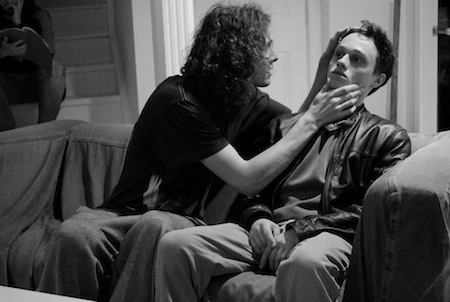
When I read the synopsis of Always on Alert (playing at the Alumnae Theatre), which tells us that the protagonist is in an isolated cabin in the Arctic attending to “the button” that could put an end to humanity, I was both intrigued and wary. It was sure to be philosophical—always up my alley, but the set-up sounded, to put it mildly, a little too obvious.
A perusal of the company’s website informed me that the “Iconoclasm Theatre Company intends to provoke audiences to examine social norms and collective understandings that may impede social justice” and that their goal is to “not only entertain but challenge audiences to examine culture, religion, and their symbols.” These intentions are certainly evident in David Lichty’s script and direction for Always on Alert.
The focus is on Donald, the first character we meet, and the only survivor in this drama. Rob Wierzbibki has a jittery and threatening presence that had me thinking he was a heroine addict desperate for a fix. In a way, he is—a deeply thinking man who hasn’t found any meaning in human life and is desperate for someone to show him some reason why we are here. He is the embodiment one of the three ideologies represented in the play—nihilism.
There is Hayden Finkelshtstain, as Duncan, representing Christian theology. While I found his talk of “sin” and “heaven” somewhat flippant, he was the most emotionally accessible character for me. This is due mostly to Finkelshtstain’s awkwardly endearing performance. Despite the fact that, ideologically speaking, his belief system was furthest from my own, I found myself drawn to him. It is in him that we glimpse the, in my opinion: essential, phenomenon of compassion.
Representing existentialism is Gregory Willmont as Will. It is with Will that Duncan has the most satisfying conversation. The two characters are deep thinkers and best suited to a match of wits. He is the most relaxed and stable presence in the claustrophobic confines of this Arctic cabin. He is not so hung up on spiritual notions and as desperate to please as Duncan, neither is he as maddeningly defeatist as Donald. He is rational, but very much in love with life, and committed to its continuance.
We never actually meet Brad, played by Marc Blanchard, because he’s already dead when we first encounter him falling out of a refrigerator. (Suffice it to say that the refrigerator figures prominently in the action.) For a corpse, he is an oddly present character. His personality is vaguely discussed by the other characters, and you get the sense that they really just need an absent character to beat up occasionally, suggesting our human need for a scapegoat when our lives aren’t quite as we’d like them to be. Blanchard is… um… convincing as a once-alive person. Maybe it’s just the fact I was able to project so much into who he might have been.
The play worked best for me when it was focused on the intimate and tangible details of their isolated life, like desperately trying to open cans of food without a can opener and the uncomfortable dynamics of forced proximity. The drama falters when Donald is left alone to talk to himself and divulge his many depressing thoughts regarding the futility of human endeavour.
While I applaud the naturalistic dialogue, I found the philosophical bantering trite. These passages might be more intriguing to those who have not yet thought much about the meaning of life and are less familiar with the philosophies represented here. I was riveted when the drama was immediate, when characters were threatened with the realities of starvation or an axe to head, but grew bored when the play became didactic.
All things considered, Always on Alert is an entertaining piece with good dialogue and convincing performances that ends with a poignant insight: despite how troubling other people can be, meaning does seem dependent on our interactions.
Details:
- Always on Alert is playing at the Alumnae Theatre (70 Berkeley St.) on July 26th and 27th
- Performances are at 2pm and 8pm.
- General admission tickets are $15.
- Tickets can be purchased online or at the Theatre Box Office. For more information, visit the Iconoclasm Theatre Website
Photo of Rob Wierzbicki and Marc Blanchard provided by Iconoclasm Theatre Company
